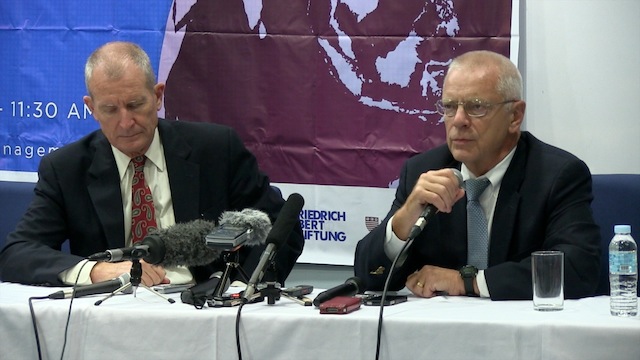SUMMARY
This is AI generated summarization, which may have errors. For context, always refer to the full article.

MANILA, Philippines – The Philippines should “find a way” to persuade China to agree to a peaceful resolution of the South China Sea (West Philippines Sea) dispute but at the same time prepare its armed forces in case the situation blows up, according to former US security officials.
“What we have to do is to find a way to defend our interest, to defend our sovereignty, to defend rule of law, to defend the proposition that disputes like this are to be resolved peacefully and not by the use of force,” former US Defense Undersecretary Walter Slocombe told reporters in Makati City on Friday, October 4.
“At the same time, to be sensible, recognize that there is a real danger of the incident blowing up and becoming a source of a much greater conflict,” Slocombe added.
Former US Pacific Command chief Dennis Blair said the Armed Forces of the Philippines and the Department of National Defense have to “raise their game” especially because external defense is a “new mission” it is not ready for.
Blair worked for a long time with his Philippine counterpart in the armed forces and used to represent the US in the Mutual Defense Board, the body that monitors implementation of the Mutual Defense Treaty between the US and the Philippines.
“Both Armed Forces of the Philippines and the Ministry of Defense better raise its game in terms of being able to have a strategy-based, multi-year effective system in order to put together the equipment, people, training, the doctrine, logistics support, and the relations with the US required to handling complex maritime issues,” said Blair.
“I have great admiration for the skill and courage and persistence of Philippine officers and defense officials, but frankly it has to organize itself for a more effective manner for this new set of responsibilities which it now faces,” Blair added.
Still focused on internal defense
External threats from Beijing is putting tremendous pressure on the Philippine military, whose resources and personnel are deployed to fight local wars.
AFP chief Gen Emmanuel Bautista aims to “conclude “ by 2016 internal security threats from the CPP-NPA-NDF (CNN), the Abu Sayyaf Group, rogue Moro National Liberation Front elements, and the Bangsamoro Islamic Freedom Fighter (BIFF).
READ: Finish insurgency, AFP chief tells commanders
Slocombe and Blair are in Manila to attend the “US, China and ASEAN: The Evolving Realities in the West Philippine Sea” symposium at the Asian Institute of Management (AIM).
The Philippines has sought US assistance in defending its maritime territory. The two countries are negotiating a new military-to-military agreement that will allow increased rotational presence of US troops in the Philippines and allow them more access to Philippine military bases.
The recently held fourth round of talks, however, proved difficult. The Philippine panel said they disagreed with their US counterparts on “critical issues.”
READ: Bases access: PH, US disagree on ‘critical provisions’
The US is the only treaty ally of the Philippines. Slocombe gave an indirect answer when asked if he thinks the US will take the side of the Philippines in the event that it comes to a confrontation.
“The treaty does not on either side say we go to war instantly if one side, one party, of the treaty invokes it,” he said.
But he added: “Nobody wants unnecessary confrontation. But there is no question that the US will live up to not only its formal treaty obligation [but] its much broader interests. Remember the US has direct interests in this area as well. It’s not simply a question of supporting the Philippines. We have interests in freedom of navigation, powerful interest in stability of the region, and interest in the principle of peaceful resolution of disputes rather than the use of force.”
China is not Soviet Union
The Philippines recently expressed concern that China has placed “concrete blocks” in disputed Panatag Shoal located off Zambales province. Government said it is clearly a “prelude to construction,” the same track China took when it claimed the Mischief Reef from the Philippines in the 1990s.
The Philippines and neighboring countries should work together to get China to play by the rules, said Slocombe.
“I think it’s not a situation where conflict with China is inevitable. China is not Soviet Union and we shouldn’t treat it like it was the Soviet Union. But it also means we shouldn’t let China take advantage by not playing by the rules,” Slocombe said.
China, he said, should realize that it is in its economic, social, and environmental interest that the region is stable.
President Aquino has allocated at least P75 billion for the Armed Forces to improve on maritime security.
READ: P75-B boost for PH navy to resist ‘bullies’
The Philippine Navy recently acquired two Hamilton-class cutters from the US.
It is waiting for Malacañang to approve a government-to-government contract to acquire 12 fighter jets from South Korea and has recently opened bidding for two new frigates.
The Armed Forces said it has no illusion it can match China’s military might but these new acquisitions are necessary for “minimum credible deterrence.” – Rappler.com
Add a comment
How does this make you feel?
There are no comments yet. Add your comment to start the conversation.